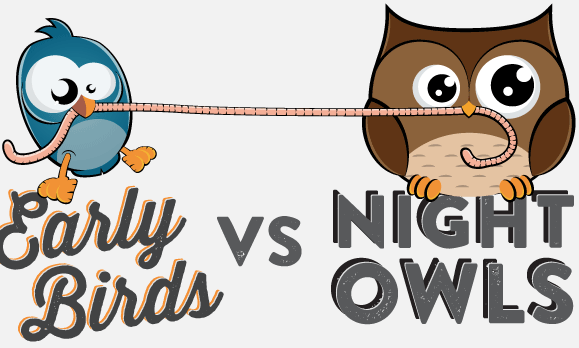
25 Apr Who Lives Longer, Night Owls or Early Birds?
Tend to burn the midnight candle or spring out of bed with first light? How does your answer impact your longevity? We curated this story by Dennis Thompson from HealthDay.

“Night owls” might pay a price when it comes to their health and longevity, a new study reports.
Folks who stay up late and struggle to wake in the morning have a 10 percent higher risk of dying sooner than so-called “morning larks” who are early to bed and early to rise, said lead researcher Kristin Knutson. She’s an associate professor of neurology at Northwestern University Feinberg School of Medicine in Chicago.
“It is important for people who are night owls to learn there may be health consequences, but there may be things they can do to help overcome those problems,” Knutson said. “There’s hope, but it may take some effort.”
This finding is based on a study of more than 433,000 British adults. As part of the study, they were asked to place themselves into one of four categories — definite morning or evening types, or moderate morning or evening types.
“For morning lark types, the clock is set to have things happen earlier in the day — go to sleep earlier, wake up earlier, eat earlier,” Knutson said. “And then, of course, the reverse is true for night owls.”
About a quarter of folks identified themselves as morning larks, and about 9 percent said they were definitely night owls, Knutson said.
The researchers then tracked the health of all participants for 6.5 years, to see whether sleeping patterns were associated with an increased risk of death and illness.
Night owls were slightly more likely to die during the study period compared with morning larks, after researchers controlled for other health risk factors, Knutson said.
Night owls also had more health problems — twice the risk of psychological disorders, 30 percent more risk of diabetes, 25 percent increased risk of neurological problems, 23 percent higher risk of gastrointestinal disorders and 22 percent increased risk of respiratory disease.
The study only found an association, and it couldn’t say why night owls have poorer health, but researchers have a couple of theories, Knutson said.
It might be that being up late gives people more opportunity to engage in less healthy behaviors, such as drinking, smoking, snacking or taking drugs, Knutson said.
But a more intriguing theory posits that the health of night owls reflects the fact that their internal clock is at odds with the rest of the world.
“The problem may be that a night owl is trying to live in a morning lark world,” Knutson said. “They have to get up earlier for work, perhaps, or if they want to socialize with friends and family that might occur earlier than their biological clock would want.
“There may be this misalignment between their internal clock and their behaviors or environment, and that may lead to problems in the long run,” she added.
Previous studies support this theory, said Dr. Andrew Varga, an assistant professor of sleep medicine with Mount Sinai Health System in New York City.
“We’ve known for a very long time that people who are shift workers — who are mostly awake during dark hours and sleep during light hours — are at risk for all sorts of bad things to happen to them, including increased mortality and increased cardiovascular risk,” said Varga, who wasn’t involved with the study.
Body rhythms affect health in other ways, too…


Sorry, the comment form is closed at this time.